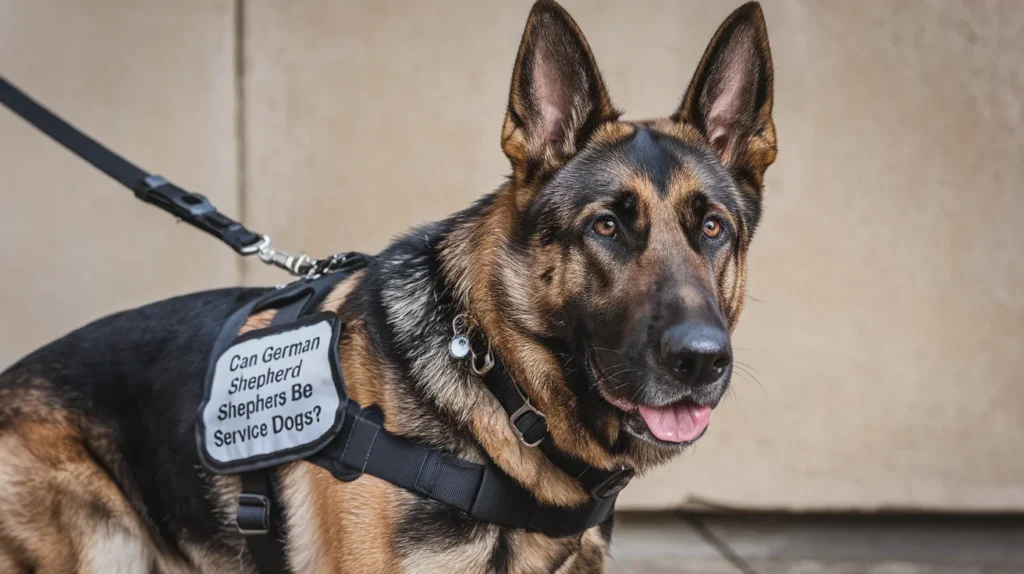German Shepherds are among the most popular dog breeds worldwide, celebrated for their intelligence, loyalty, and adaptability. A frequently asked question is whether German Shepherds can excel as service dogs. The short answer is yes, they absolutely can! However, understanding the why and how behind their suitability as service dogs requires a deep dive into their characteristics, training requirements, and roles. This article will explore the full scope of the question, covering everything you need to know about German Shepherds as service dogs.
Why Are German Shepherds Considered Ideal Service Dogs for Various Roles?
German Shepherds are ideal service dogs because of their intelligence, trainability, and adaptability. These traits make them suitable for a variety of tasks, such as guiding the visually impaired, assisting individuals with mobility challenges, and even supporting people with psychological conditions.
Their strong work ethic and protective instincts allow them to stay focused on their job while ensuring their handler’s safety. This makes them stand out among other breeds typically used for service work.
Example:
Imagine Sarah, who uses a wheelchair. Her German Shepherd, Max, helps her by retrieving dropped items, opening doors, and providing emotional support. This bond not only increases Sarah’s independence but also enhances her overall quality of life.
What Specific Traits Make German Shepherds Excel in Service Dog Training?
German Shepherds excel in service dog training due to their unique combination of physical and mental attributes.
- High intelligence: German Shepherds rank among the top three smartest dog breeds.
- Strong focus: They can stay attentive for long periods, a critical trait for service work.
- Loyal nature: Their devotion to their handler makes them reliable companions.
- Physical strength: This allows them to assist with tasks like pulling wheelchairs or providing stability.
Their adaptability also ensures they can perform well in various environments, whether in a crowded urban setting or a quiet rural home.
Can German Shepherds Be Trained for Emotional Support and Psychiatric Service Work?
Yes, German Shepherds are excellent candidates for emotional support and psychiatric service roles. Their ability to detect emotional changes in their handlers makes them invaluable for individuals with anxiety, depression, PTSD, or similar conditions.
For example, a German Shepherd can alert its handler during a panic attack, provide grounding by leaning against them, or remind them to take medication. Their natural empathy and calm demeanor make them a source of comfort in stressful situations.
Are German Shepherds Suitable for Guiding Visually Impaired Individuals?
German Shepherds are one of the most commonly used breeds for guide dog services due to their ability to navigate complex environments. They can learn to guide visually impaired individuals safely through crowded streets, across intersections, and around obstacles.
Their intuitive sense of direction and protective instincts ensure the handler’s safety. However, this role requires rigorous training and a temperament that can handle high-pressure situations.
Example:
Mark, who is blind, relies on his German Shepherd, Luna, to get to work every day. Luna not only ensures Mark avoids hazards but also helps him feel confident in his independence.
How Does the Training Process for German Shepherd Service Dogs Work?
Training a German Shepherd to become a service dog involves multiple phases:
- Basic obedience training: Teaching commands like sit, stay, and come.
- Task-specific training: Focusing on the specific needs of the handler, such as retrieving objects or providing mobility assistance.
- Public access training: Ensuring the dog behaves appropriately in public spaces, like restaurants and public transport.
Consistency, patience, and positive reinforcement are critical during training. Professional guidance is often recommended, as service dog training requires expertise and a structured approach.
What Are the Challenges of Using German Shepherds as Service Dogs?
Despite their many strengths, there are challenges to using German Shepherds as service dogs:
- High energy levels: They need regular exercise to stay balanced and focused.
- Potential overprotectiveness: This trait must be managed to ensure they remain calm in public.
- Shedding: Their thick double coat requires regular grooming, which may not suit all handlers.
Addressing these challenges requires proper training, consistent routines, and an understanding of the breed’s needs.
Can German Shepherds Work as Service Dogs for Children?
Yes, German Shepherds can serve as service dogs for children, particularly those with autism or other developmental disorders. Their ability to bond deeply with their handler makes them excellent for offering emotional support, safety, and companionship.
For instance, they can prevent a child from wandering off, provide sensory grounding during meltdowns, and create a calming presence in overwhelming environments.
Example:
A family with an autistic child named Emily uses a German Shepherd, Rex, to keep her safe during outings. Rex also helps Emily feel more secure at social events.
How Do German Shepherd Service Dogs Differ from Other Breeds in Similar Roles?
While other breeds like Labradors and Golden Retrievers are commonly used for service work, German Shepherds bring unique strengths. Their protective nature, physical power, and high intelligence set them apart.
However, their energy levels and strong-willed nature require an experienced handler or trainer, making them less suited for novice dog owners.
Can a German Shepherd Service Dog Improve the Handler’s Quality of Life?
Absolutely! A German Shepherd service dog can transform the life of its handler by offering:
- Increased independence.
- Improved emotional well-being.
- Enhanced physical safety.
- Constant companionship.
Handlers often describe their service dogs as more than just helpers they become lifelong partners.
Conclusion
So, can German Shepherds be service dogs? The answer is a resounding yes. Their intelligence, loyalty, and versatility make them exceptional candidates for service roles across a wide range of needs. While there are challenges, proper training and understanding of the breed can unlock their full potential.
Whether they’re guiding someone through a busy city, comforting a person with PTSD, or helping a child with autism, German Shepherds are proof of the incredible bond between humans and dogs. For anyone considering this breed for service work, the rewards far outweigh the effort.

